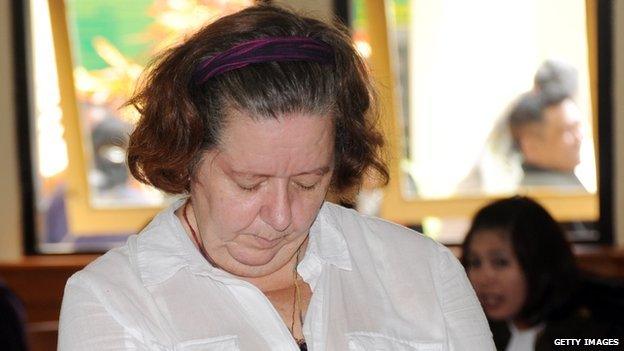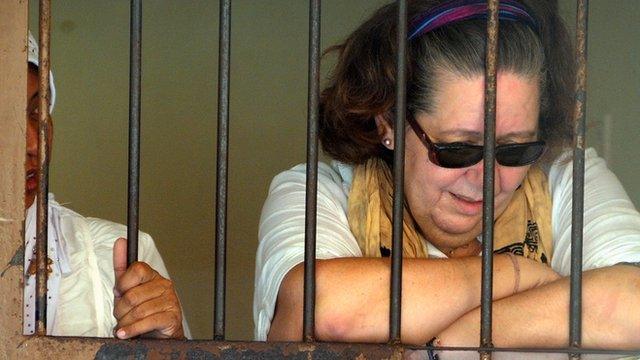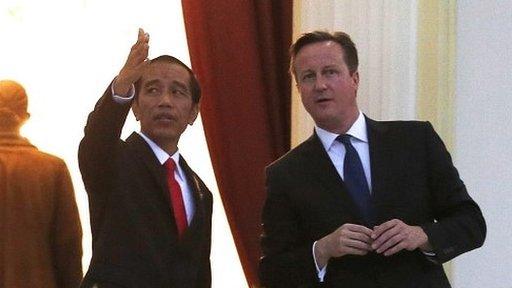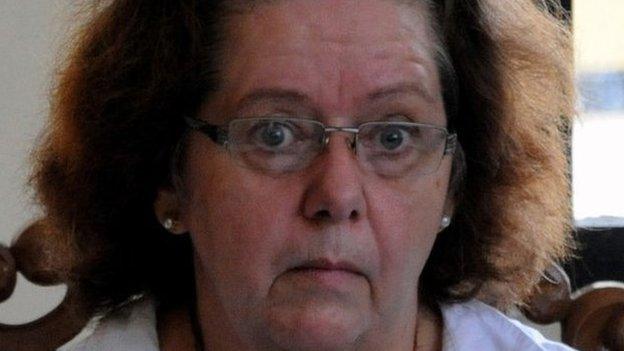Lindsay Sandiford: David Cameron's death row dilemma
- Published

Lindsay Sandiford's lawyers argued she was pressured in to smuggling the drugs by a criminal gang
Trade and counter-terrorism co-operation are officially at the top of David Cameron's agenda on a two-day visit to Indonesia as part of a tour of South East Asia.
But there's one issue the prime minister might be less keen to talk about.
Lindsay Sandiford, a 59-year-old grandmother, finds herself on death row in Indonesia's notorious Kerobokan Prison, not knowing when she might face a firing squad.
It's two-and-half years since the former legal secretary from Cheltenham was sentenced to death after being caught smuggling 4.8kg (10.6lb) of cocaine from Bangkok to Bali.
Her lawyers argued she was pressured into smuggling the drugs by a criminal gang.
She co-operated with the Indonesia police in a sting operation leading to the arrest of several members of that gang.
But at her sentencing hearing in 2013, that co-operation appeared to count for nothing as she was given the death sentence.
All appeal attempts have so far come to nothing.
'Delicate business'
It is a potentially awkward moment for Mr Cameron.
He is expected to announce hundreds of millions of pounds worth of trade deals with Indonesia.
At the same time a British citizen faces being lined up and shot.
Sandiford's legal team, which she is struggling to pay for, will be hoping Mr Cameron can exert some pressure on Indonesian President Joko Widodo when the two men meet here in Jakarta.
But it is a delicate business.

Despite David Cameron's visit, Lindsay Sandiford's fate remains very much uncertain
In the past such pressure has not worked.
So far this year Indonesia has executed 12 foreigners for drugs offences.
Perhaps the highest profile of them were two Australians Andrew Chan and Myuran Sukumaran, the ringleaders of the Bali Nine drug ring.
They were executed in April after being caught trying to smuggling 8.3kg (18.2lb) of heroin from Bali to Australia in in 2005.
In their case the Australian government was publicly critical of Indonesia in an effort to get Jakarta to reverse the sentences.
Australian ministers even threatened to cut off foreign aid.
It didn't work.
Indonesia did not appear to like being told what to do.
'Risks well-known'
And the death penalty for drugs offences has broad public support in Indonesia.
"Take one life to save the lives of many," one Indonesian man, who didn't want to give his name, told us on the beach in Bali.
"Drugs ruin people's lives."
And there can be no doubt that smuggling drugs in Indonesia, a country whose harsh treatment of drug offenders is well known, is a very stupid thing to do.
The rewards may be great but so are the risks.
"Britain or Australia don't criticise the United States which has executed hundreds of people," the man added.
And there is an element of double standards here.
Nobody realistically expects Britain to jeopardise trade ties with the US where there are 3,000 people currently on death row, including British citizens.
Or with China, which executes thousands of people every year.
In the run-up to the execution of Chan and Sukumaran there were large public demonstrations in support of the Indonesian government.

Lindsay Sandiford was sentenced to death in Indonesia in 2013
The death penalty is a vote-winner here.
So Mr Cameron is likely to try to avoid talking publicly about Sandiford's case.
Any pressure will probably be applied discreetly and behind the scenes.
Certainly speaking to Sandiford's legal team, you get the impression they want to avoid any public criticism of the Indonesian government or justice system.
What they would like is for the British government to help fund Sandiford's legal costs, something it has so far refused to do despite numerous legal challenges.
So despite Mr Cameron's visit, Sandiford's fate remains very much uncertain.
For more than two-and-a-half years, she has sat on death row, not knowing how many days, weeks, months or years she has left to live.
- Published27 July 2015

- Published27 July 2015

- Published6 May 2015

- Published29 April 2015
